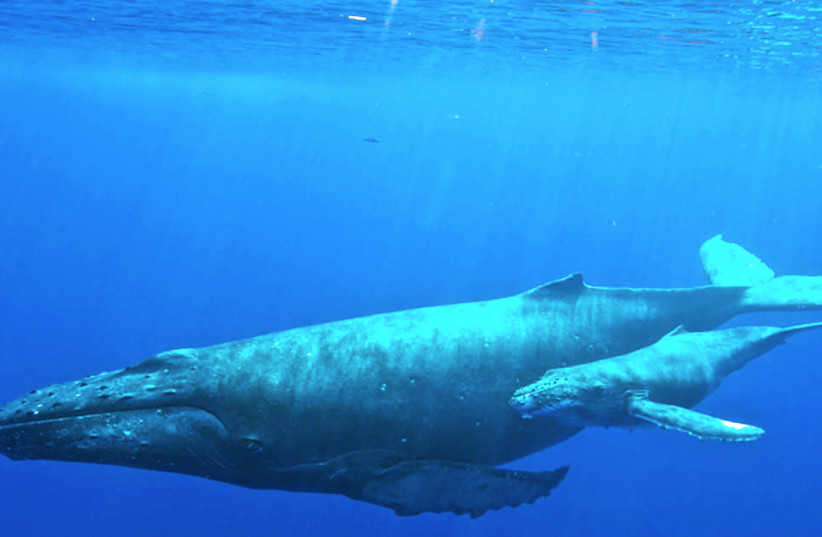Despite past studies proving that whales have the capacity to carbon capture, which helps combat global warming, the amount of carbon they can capture just isn’t enough, according to a new study published earlier this week.
Carbon capturing is the process that carbon dioxide, a main contributor to global warming, can be absorbed and stored so that it does not impact the climate.
The open-access peer-reviewed article, published in Frontiers in Marine Science, details the study of baleen whales’ carbon-capturing abilities on a global and national scale.
The ocean’s carbon cycle
Whales collect carbon in their bodies over decades. When the whale dies, it will sink to the ocean floor, where it will be covered in sediment. The sediment traps the carbon dioxide, preventing it from re-entering the atmosphere.
The whales’ dead bodies also provide food for other animals for up to 50 years after the whales’ demise, according to the Natural History Museum. This cements the whale as a creature of significant value in maintaining the ocean’s ecosystem.

However, as the researchers note, “southern right whales (Eubalaena australis), have a tendency to float after death and are less likely to sink” and therefore, the CO2 isn’t trapped in sediment but released into the atmosphere.
According to an earlier study, in San Francisco, whale deaths comprise roughly 60% of the estimated total annual carbon removal of the area equivalent to about 10 890 tons of carbon. This amount would dramatically increase if the practice of whaling, whereby whales are killed for their meat and blubber, would stop.
Whaling was banned in 1986, but Japan, Norway and Iceland have been responsible for the deaths of nearly 40,000 large whales since the ban was enacted, according to Whale and Dolphin Conservation. Over 1000 whales are killed annually by whaling.
Do whales reduce carbon in the atmosphere?
Whales plan an important role in the oceanic food chain, which can lower Carbon Dioxide (CO2) in the atmosphere.
Whales absorb a lot of CO2 through eating Krill. Krill eat phytoplankton, a type of plankton that absorbs CO2 during photosynthesis. The plankton also feeds on whale feces, which in turn feeds the krill and the whales. However, whales release 3-5 times the amount of iron needed by the plankton in their feces. Phytoplankton absorb 572 tons of carbon a year, according to the study. However, much of this is rereleased into the upper layers of the ocean and returns to the atmosphere.
The researchers cited an estimation that in the year 2000, 240,000 tonnes of CO2 were exported into the Southern Ocean by promotion of phytoplankton growth.
“Blue whale species are likely the largest contributors to iron supply, due to their higher prey consumption, and thus having a greater potential for enhanced carbon fluxes,” according to the study.
The researchers acknowledged that the amount of excessive iron produced in the whale feces will vary depending on their geographic location and the available nutrients there.
“The overall contribution of whales living tissue to carbon storage is limited by their lifespan (at least several decades) and their own respiration as for all animals. However, the value of animals to carbon sequestration in general also needs to be assessed in the context of their ecosystem function,” the researchers explained.
Additionally, whales exhale more CO2 during their migration periods.
Whales are also responsible for bringing Iron and CO2 to the atmosphere by carrying out the ‘whale pump,’ which is the term to describe whales rising and sinking in the ocean in search of food.
“There is no evidence of how more effective whales could be in relocating iron from the deeper Southern Ocean to the surface when compared to the typical mixing rates,” the study explains
Ending the false hope that whales will solve climate change
"Our study supports that whales are important for the marine ecosystem, but their contribution to the global carbon flux is too small to effectively reduce atmospheric carbon," said Dr. Jan-Olaf Meynecke, an author of the study.
"While our research group would very much like to highlight the opposite in order to benefit the conservation of whales and perhaps one day use carbon credits to support research, the debate is misguiding and creates false hope."
"This is in contrast to media perpetuating whales as climate engineers."
"Creating false hope in the ability of charismatic species to be climate engineers may act to further delay the urgent behavioral change needed to avert catastrophic climate change impacts, which can, in turn, have indirect consequences for the recovery of whale populations."
"Creating false hope in the ability of charismatic species to be climate engineers may further delay the urgent behavioral change needed to avert catastrophic climate change impacts"
Dr. Jan-Olaf Meynecke
"Previous estimations neglect the scale in which carbon sequestration occurred both temporally and spatially. Some of the pathways suggested for carbon sequestration such as whale falls (when whales die and sink to the ocean floor but retain carbon for decades) also underestimate the breathing of whales."
"We think it is important to acknowledge that there are other values of whales that are more relevant to drive their conservation than carbon capture."
"Large-scale protection of marine environments including the habitats of whales will build resilience and assist with natural carbon capture at a global scale."
The Environment and Climate Change portal is produced in cooperation with the Goldman Sonnenfeldt School of Sustainability and Climate Change at Ben-Gurion University of the Negev. The Jerusalem Post maintains all editorial decisions related to the content.
